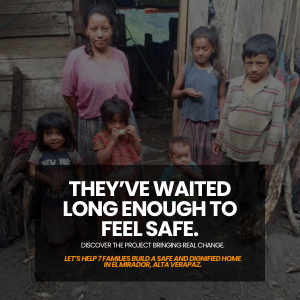How we work
CONSTRU CASA is a non-profit organization improving the quality of life among Guatemalans living in extreme poverty through the provision of basic housing, support programs, and community development projects. We work to lift entire communities out of poverty though our integral community development programs which include the construction of dignified concrete block housing in combination with the construction of community buildings such as schools, clinics, orphanages, and community centers.
Working in collaboration with local social work organizations, Constru Casa continues to help families and communities further develop themselves and help them on the path towards a better future.

Constru Casa has made a noticeable impact in the lives of the families and communities in which they have built. When a family receives a new house, it can mean a whole new beginning. It is a new space to grow their family with new opportunities. An impact report was collected in November of 2017 by Natalia A. Bermudez in regard to the effect that a new home and follow up program of Constru Casa has had on the receiving families and communities. She concluded that there has been a major change for many Guatemalan families through Constru Casa’s integrated approach to bettering the lives of those who are in need.
Impact of our work
Constru Casa focuses on the entire community with a holistic approach. Our integrated programs are designed to develop communities through a variety of construction projects, including housing and community buildings. We collaborate with local partner organizations to identify the community’s key needs and contribute to meaningful solutions.
Community Development


A Complete House from Constru Casa is built with concrete blocks, a corrugated iron roof, and a concrete floor. Families can choose from various designs, ranging from one to three rooms, with or without a bathroom, priced between $2,100 and $6,000 USD. These earthquake-resistant and climate-resistant homes are tailored to meet the needs of families in extreme poverty. The design and the 4-year follow-up program ensure long-term durability and support.
Building Houses
Constru Casa supports partner organizations in community development and construction. We build communal facilities such as schools, libraries, daycare centers, community centers, medical clinics, orphanages, and recreational areas. Our services include initial consulting, needs assessment, building design, construction supervision, and project management. These projects are typically proposed by partner organizations that have assessed the community’s needs and secured funding. The success of these projects relies on the commitment of both the local community and the partnering organization.
Community Construction


Constru Casa’s homes are built with an eco-friendly approach compared to traditional methods. Our construction uses a pin system, which replaces concrete columns with vertically installed rebar, reducing the amount of concrete needed and eliminating wooden forms. This method is quicker, safer, and provides anti-seismic benefits. The houses feature clay-based stucco siding, which uses less concrete. Additionally, families have the option to receive eco-friendly upgrades depending on available donations.
Ecological Housing

































